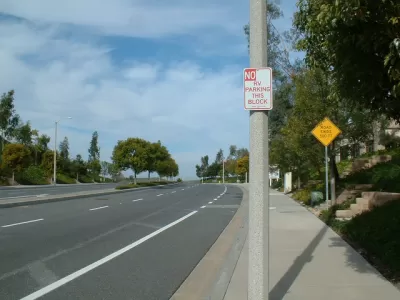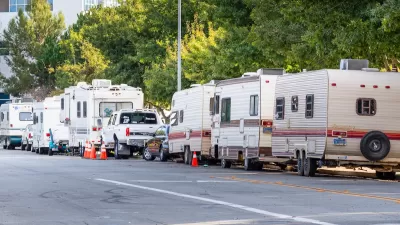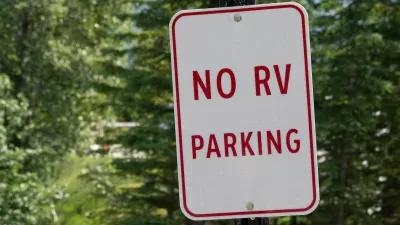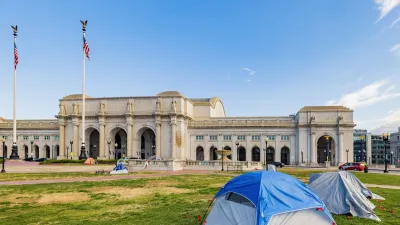Coastal cities are taking a no-tolerance approach to RVs on their streets, even as they otherwise strive to mitigate and prevent homelessness.

Although policies aimed at punishing or pushing out homelessness have long been decried by advocates, many cities are still—or even increasingly—pursuing them, according to journalist Kate Wheeling. In Pacific Standard, Wheeling highlights the problem as it manifests in Santa Barbara, California—where more than one-third of homeless residents live in RVs, and where "decades of cat-and-mouse games with city officials have made it nearly impossible for RV dwellers to find a place to park their homes."
Many cities justify RV bans with the untested assumption that parked RVs will lead to accidents by blocking drivers' line of sight. But some, including Santa Cruz and Los Angeles, have seen their bans overturned by lawsuits or by the state Coastal Commission for specifically targeting homeless people. Of Santa Barbara's ban, for example, Wheeling writes:
In the fall of 2016, a fed-up city council took more comprehensive action, voting unanimously to pass an ordinance banning on-street parking citywide for all oversized vehicles more than 25 feet long, 80 inches wide, or 82 inches tall. Unless, of course, that oversized vehicle is a government or utility vehicle, a contractor's pick-up, a commercial delivery truck, or a resident's or tourist's RV with the proper temporary permit. In other words, the new ordinance, which will go into effect in September, may not explicitly or exclusively describe RVs like Linda's, but no one is under any illusions about who the intended target is.
FULL STORY: DRIVEN OUT

Alabama: Trump Terminates Settlements for Black Communities Harmed By Raw Sewage
Trump deemed the landmark civil rights agreement “illegal DEI and environmental justice policy.”

Study: Maui’s Plan to Convert Vacation Rentals to Long-Term Housing Could Cause Nearly $1 Billion Economic Loss
The plan would reduce visitor accommodation by 25% resulting in 1,900 jobs lost.

Planetizen Federal Action Tracker
A weekly monitor of how Trump’s orders and actions are impacting planners and planning in America.

Waymo Gets Permission to Map SF’s Market Street
If allowed to operate on the traffic-restricted street, Waymo’s autonomous taxis would have a leg up over ride-hailing competitors — and counter the city’s efforts to grow bike and pedestrian on the thoroughfare.

Parklet Symposium Highlights the Success of Shared Spaces
Parklets got a boost during the Covid-19 pandemic, when the concept was translated to outdoor dining programs that offered restaurants a lifeline during the shutdown.

Federal Homelessness Agency Places Entire Staff on Leave
The U.S. Interagency Council on Homelessness is the only federal agency dedicated to preventing and ending homelessness.
Urban Design for Planners 1: Software Tools
This six-course series explores essential urban design concepts using open source software and equips planners with the tools they need to participate fully in the urban design process.
Planning for Universal Design
Learn the tools for implementing Universal Design in planning regulations.
Caltrans
Smith Gee Studio
Institute for Housing and Urban Development Studies (IHS)
City of Grandview
Harvard GSD Executive Education
Toledo-Lucas County Plan Commissions
Salt Lake City
NYU Wagner Graduate School of Public Service





























